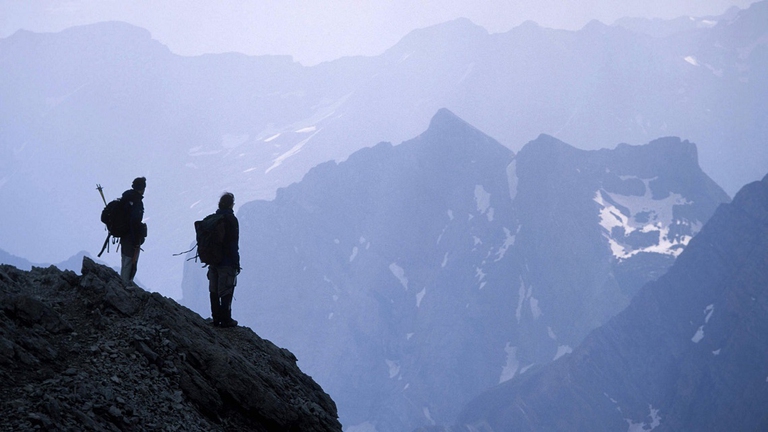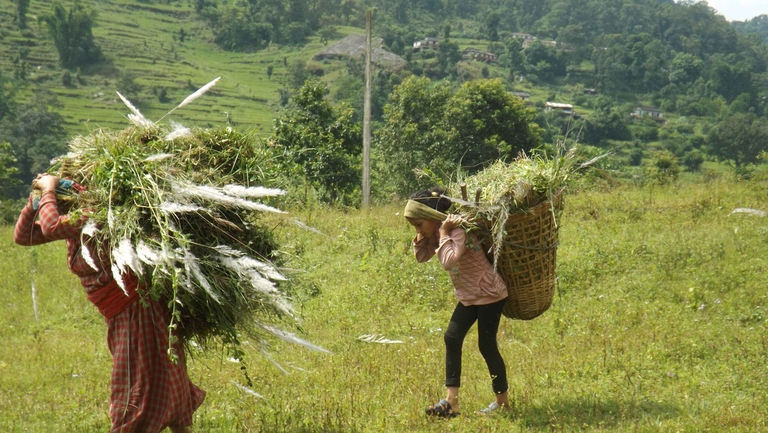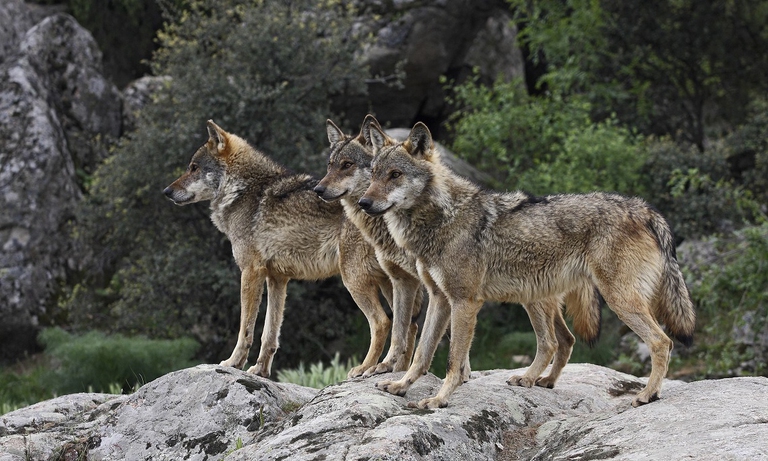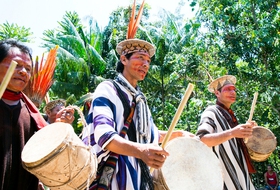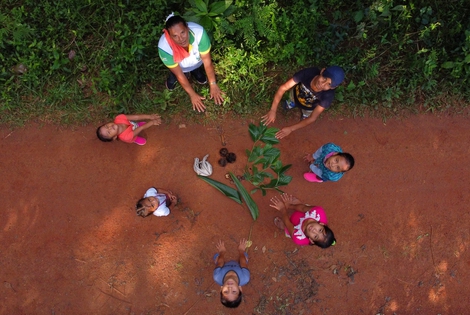
The Amazon became an alternative classroom during the pandemic. Now, the educational forest in Batraja, Bolivia, lives on to teach children and adults the value of nature.
The 2019 edition of International Mountain Day is “Mountains matter for youth”, highlighting the need to bring young people back to highland areas to take care of their cultural and natural resources.
Since the early history of alpinism, the relationship with mountains has always been characterised by challenges. Challenges such as facing vertical walls and the forces of nature. Humanity’s desire to alter the landscape is treacherous. But considering nature as a mere bystander is also misguided. It actually talks to us, though maybe we aren’t able to listen to it anymore. To listen to its voice we leave plains and cities, we cross forests and climb mountains in search of that thread that broke long ago. Mountains, potentially terrible and dangerous, remind us of how small and imperfect we humans are and, especially, that the world doesn’t revolve around us.
Read more: 10 songs about our love for mountains
Mountains cover nearly 27 per cent of the Earth’s land mass and play a crucial role in sustainable economic growth. International Mountain Day is celebrated on 11 December and was established by the United Nations in 2002, in occasion of the International Year of Mountains, which was held in 2003. The celebration aims to increase awareness on the importance of mountains for the health of the planet and well-being of billions of people.
Strictly correlated to the reduction in food is the growth in migratory flows, as more and more people leave their mountainous birthplaces to move to urban centres or other countries. The depopulation of such areas will result in an inestimable loss in terms of ecosystem services and the conservation of agrobiodiversity, as well as the extinction of many cultures that have developed among the wind, snow and wild animals. To reverse this trend, investments and policies that are able to alleviate the harsh conditions that mountains communities face are required.
Sustainable use of Mountain resources is key…@Mount_Mulanje #mountainsmatter#2019IMDMalawi pic.twitter.com/8sXH4UOgSJ
— Mountains Malawi (@MalawiMountains) December 8, 2019
In particular, it’s essential to favour young people’s return to mountain areas, so that they may contribute to revitalising them and safeguarding their vulnerable natural resources. The theme of the 2019 edition is Mountains matter for youth, highlighting the need to put mountains and their inhabitants at the centre of national and international development agendas, which can only occur if new generations demonstrate commitment and environmental sensibility. Living in mountain areas may be difficult, but many young people are increasingly tired of life in the city, which can be alienating, and disillusioned with unsustainable urban development models. To encourage a return to highlands, investments, work opportunities and public services are needed.
The Mountain Partnership Global Meeting was held in Rome from 11 to 13 December 2017 at the FAO headquarters. Its objective was to promote and support concrete and long-lasting initiatives in favour of mountain populations and their territories. The summit aimed to guarantee that the sustainable development of mountain areas is integrated in the UN’s 2030 Agenda and the actuation of the Paris Agreement.
Read more: Why mountain areas are essential for sustainable development
Big decisions are inevitably made by governments and international organisations, but we can each give something back to mountains: picking up waste we find across trails (yes, people still throw their garbage on the ground), trying not to damage flora and fauna, and moving in small groups to not disturb animals. Mountains will appreciate this and, maybe, we’ll be able to hear their voice if we’re quiet enough.
The theme chosen for 2018 was #MountainsMatter because mountains are often still forgotten. Yet they play a vital role in providing key ecosystem goods and services to the plane. They’re also extremely vulnerable to climate change and we need to step up and raise attention to mountains. The degradation of mountain environments has grave repercussions both on people who live at high altitudes, almost one billion, as well as on most of the rest of the world, seeing that over half the human population depends on mountains for water, food and clean energy. The rise in temperatures is in fact provoking the melting of glaciers at a never before seen rate, putting the supply of fresh water for millions of people living downstream in valleys at risk. The food security of almost 330 million people that live on mountains is threatened by the natural catastrophes made more acute by climate change.
The theme chosen for 2017 was “Mountain under Pressure: climate, hunger, migration” and highlights the enormously negative impact of climate change on mountain ecosystems, considered by the UN’s Food and Agriculture Organisation (FAO) the first to be affected by climate change.
The 2016 theme was “Mountain Cultures: celebrating diversity and strengthening identity”. International Mountain Day 2016 was an important occasion to highlight the variety and richness of mountainous regions’ cultures, promoting the multiple cultural identities of these areas and ensuring that the rights of indigenous populations are recognised and their traditions survive.
The 2015 theme was “Promoting mountain products for better livelihoods”. It aimed to draw attention to the importance of different products crafted by mountainous communities, principally agricultural ones. Families of farmers have developed unique, resilient and sustainable production systems adapted to their local environments and suitable to the creation of specific products and services, which are highly diversified.
Small-scale mountain agriculture can’t compete with the volumes of lowland production but it has the potential to tap into niche markets, such as the organic and fair trade ones. These aspects represent a further incentive to protect mountains threatened by climate change, deforestation and soil degradation.
Over a century ago John Muir invited people to enjoy mountains’ soothing and consoling power, when these still weren’t a choice destination for stressed out individuals.
“Climb the mountains and get their good tidings. Nature’s peace will flow into you as sunshine flows into trees. The winds will blow their own freshness into you, and the storms their energy, while cares will drop away from you like the leaves of Autumn.”
Siamo anche su WhatsApp. Segui il canale ufficiale LifeGate per restare aggiornata, aggiornato sulle ultime notizie e sulle nostre attività.
![]()
Quest'opera è distribuita con Licenza Creative Commons Attribuzione - Non commerciale - Non opere derivate 4.0 Internazionale.
The Amazon became an alternative classroom during the pandemic. Now, the educational forest in Batraja, Bolivia, lives on to teach children and adults the value of nature.
Our species took its first steps in a world covered in trees. Today, forests offer us sustenance, shelter, and clean the air that we breathe.
100,000 mink will be culled in Spain after testing positive for coronavirus. Meanwhile, the Netherlands abandons mink farming completely.
The dog meat festival in Yulin – where ten thousand cats and dogs are butchered – is taking place this year, notwithstanding the coronavirus pandemic.
Bangladesh suffered widespread damage as a result of Cyclone Amphan. Yet the Sundarbans mangrove forest acted as a natural barrier protecting the country from further destruction, as it has done countless times before.
On top of a 2.4 million dollar compensation, the indigenous Ashaninka people will receive an official apology from the companies who deforested their lands in the 1980s.
The tapir was reintroduced into Brazil’s Atlantic Forest, the country’s most at-risk ecosystem. The species can play a key role in the forest’s recovery.
Forests are home to 80 per cent of the world’s terrestrial biodiversity. This year’s International Day of Forests highlights the urgent changes needed to save them.
Joaquin Phoenix, who won Best Actor at the 2020 Oscars, reminded us that we need to overcome our egocentric view of the world, and rather choose love and compassion towards others and the natural world.
